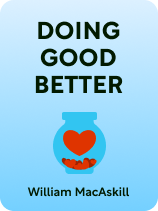

This article is an excerpt from the Shortform book guide to "Doing Good Better" by William MacAskill. Shortform has the world's best summaries and analyses of books you should be reading.
Like this article? Sign up for a free trial here.
Do you ever think about what could have been? How can answering that question help you make better decisions?
In his book Doing Good Better, William MacAskill presents the concept of counterfactual reasoning as a tool for effective altruism. He explains how this approach can help you evaluate the real-world impact of your charitable choices and career decisions.
Read more to discover a more strategic approach to making a difference in the world.
Assess the Counterfactual
MacAskill argues that effective altruism requires assessing the counterfactual—that is, determining what would have happened if we had taken a different course of action.
(Shortform note: Counterfactual reasoning is pervasive in MacAskill’s academic discipline of philosophy, as philosophers use it to think about modal truths—truths about what could have been the case, in another possible world. For example, philosophers might reason counterfactually about whether it could have been true that 2+2=5, or whether it could have been true that nothing existed at all.)
Counterfactual reasoning is common in everyday life, writes MacAskill. For example, if you spent $40 getting drinks with friends, you might reason that you could’ve instead put that money toward a monthly gym membership. Likewise, in the context of effective altruism, you might reason that if you hadn’t given your money to charity A, you could have instead given it to charity B, or if you hadn’t volunteered at organization X, you could have instead volunteered at organization Y.
The upshot is that you should perform the action that maximizes your benefit relative to the counterfactual. For example, imagine that you’ve decided to become a doctor out of a desire to help needy patients. Although this might seem like an effective way to help others, MacAskill points out that it’s actually not especially effective, because if you hadn’t become a doctor, someone else would have simply taken your place. In other words, you aren’t treating patients who otherwise would receive no treatment; you’re treating patients who would have otherwise received treatment from someone else.
By contrast, if you became a doctor to donate most of your salary to charity, that would fare better under the counterfactual test—after all, the other person who would’ve gotten your job as a doctor likely wouldn’t have donated as much.
(Shortform note: Effective altruists clarify that, for the same reason becoming a doctor to help others fails the counterfactual test, other helping professions typically fail it as well. For example, you might think that becoming a teacher in a low-income area will allow you to do good for others. But if you hadn’t become a teacher, someone else would have instead of you, so becoming a teacher probably doesn’t pass the counterfactual test.)

———End of Preview———
Like what you just read? Read the rest of the world's best book summary and analysis of William MacAskill's "Doing Good Better" at Shortform.
Here's what you'll find in our full Doing Good Better summary:
- How you can save hundreds of lives by being a good person
- The principles behind the effective altruism movement
- How to determine which charities are worth funding






